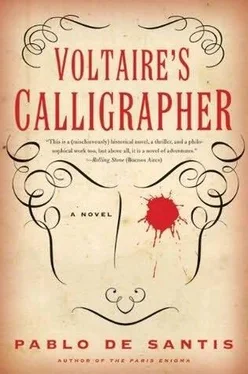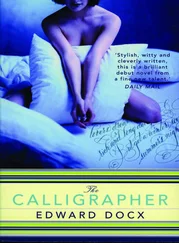“Only some of what we know as automaton makers is ever passed on to our disciples. The real secrets take years to come to light and may only come postmortem, like an ambiguous will that can never be clarified. When the disciple is twice what his master was, when the same thirst, the same resentment, the same hate toward the same enemies has rubbed off on him, when somehow he is now the other, only then does he learn the truth. Fabres, who taught me everything, also hid everything from me. When I approached his deathbed to hear the last line in the book he had patiently written on me, all he said was ‘You and I are automatons. What need does the world have of us?’ And then he died.
“While his other disciples eagerly awaited the reading of the will-which defrauded us all-I hoped for a letter, a paper folded in two, a new type of gear, or the drawings for a mechanism that would allow me to follow his trail once again. Instead, I received a book called De Progressione Diódica , a dissertation on the system that reduces all numbers to one and zero. I wasn’t particularly fond of math. I thought about selling the book, but it had been damaged and rebound. It was no longer of any value.
“Months later, one of my cats knocked the book off the top shelf, and it fell on my inkwell, spilling it. That called to mind the scribe that had betrayed me in front of the czar. I flipped through the book without reading it, remembering every second of my failure instead. Sometimes that happens; we don’t see the printed word but only what our mind quickly scrawls across someone else’s pages. The morning light fell straight on the book, and I noticed a faint annotation, then another, and another. My master had used the margins to pencil in his spidery inscriptions.”
Von Knepper had already filled my glass three times. I no longer had the strength to even stand. Everything around me blurred together, as if nothing wanted to be separate from anything else. Sober-sober not only that night but always and forever-Von Knepper continued to speak without looking at me. Like an actor, his eyes were fixed on an imaginary spectator, to prevent the audience from distracting him from his lines.
“It took me two weeks to decipher those words and the next few years to turn those ideas into reality. I learned to encode iron plates with the orders automatons need, so all you have to do is change the plate to give them new instructions.”
He handed me one; it contained a series of perforations that created a pattern I couldn’t interpret.
“There are words hidden in those holes, and now my creatures seem as alive as Fabres’. But I’ve reached a point my master never dreamed of: my creature has taken the place of a man.”
“I saw the bishop a few days ago. He was still working in the dark.”
“That’s no longer necessary. Now anyone who sees him up close, in good light, will think he’s a real man. My visits to the burial chamber are over. My automaton is more authentic than the ailing bishop, who didn’t even look like himself anymore.”
“Now that your work is done, how can you be sure they won’t kill you?”
“The machine needs constant adjustments. I’m the only one who can change the instructions, and I’ll make sure no one else knows how. I’m safe.”
I had finished the last drop of cognac and was beginning to realize the danger each word entailed. I wanted to ask Von Knepper why he had told me the truth, what he wanted from me. In a fit of optimism, I decided he might have something to offer me. My eyes fell shut for a few seconds, despite my fear. When I opened them, I heard Von Knepper answer the question I had never asked:
“There’s no need to hide anything from a dead man.”
Von Knepper seemed a little embarrassed by the chain of betrayals that would lead to my death.
“My daughter told me about you and your visit to the cemetery. Don’t blame her; she wanted me to know she’d gone out, that she could lead a normal life. The poor thing has been so cloistered in our world, she believes these nightly forays are normal. When I found out, I told Abbot Mazy of your recent actions. They don’t know your name, but they know to look for one of Clarissa’s suitors. Why get you killed? That wouldn’t make me happy.”
“What can I do to save myself?”
“Leave Paris and my daughter. It’s love that causes her condition. I have to protect her from love.”
“That’s impossible. I can go, but someone else will come along, or Clarissa will decide to live her own life.”
“Anything could happen. My profession has taught me a lesson in humility: even the most perfect machines fail, and mechanisms that seem infallible stop working for no apparent reason. No one has yet invented a perpetuum mobile.”
“Let me see her one last time.”
“Last times never accomplish anything.”
“I want to tell her that if I go, it’s not of my own free will.”
“She knows. Clarissa knows why you’re fleeing. I’ve told her about your colleague, the abbot’s calligrapher. Although that might not be such a bad end: your blood could become his ink.”
“That’s just part of the legend around Silas Darel.”
“I saw it with my own eyes: the mute calligrapher, the thick book, the red ink. Your name and mine are written there, as well as everything we do, maybe even what we’re saying now.”
With a wave of his hand, Von Knepper threw me out of his study and his world. He hurried to slide the bolts shut, as if locking me in a prison made of cities and countries and continents.
I left the house wondering just how grave the danger was. It was a restless night, every sound heralding the abbot’s men coming for me. The next morning I set out for Siccard House to collect my pay and thus have the means to leave Paris. I walked hand in hand with fear: I would look from side to side and see a foe in every face. It didn’t have to be a uniform or a cassock to scare me; an old woman’s glance out of the corner of her eye, a hungry dog following on my heels, a boy waving a wooden sword was enough.
Several customers were waiting for their merchandise at Siccard House: an usher, the legal sheets bearing the watermark of blind justice; a priest, a sheaf of parchment; a musician, staff paper tied with blue ribbon. The trafficking of messenger women had served as veiled publicity for the legal, public face of young Siccard’s business. I ran into him on the second floor, always industrious and in a hurry, as if fearing his dead father might suddenly appear and demand to see the balance sheet. He asked me about Dussel, but I had nothing to tell him. Dussel and I never spoke; he rushed home after work every day, though no one was ever waiting for him in his rented room. Before heading into the office at the end of the hall, where Juliette was waiting for me, I asked Siccard for the last few days’ pay.
“Can’t you wait until next week?”
“No. I have an urgent expense.”
“What about tomorrow?”
“It has to be today. The shop downstairs is full of customers. One of them will pay in cash.”
We were repeating a little scene that dated back to the start of the business itself, long before he was born. Young Siccard always paid, but he felt morally obliged to resist a little. That’s what his father had done for decades. Aristide walked away with his head bowed, as if he’d been hurt by my words. I went into the last office, said hello to the messenger, and was starting to prepare my inks when Juliette interrupted me.
“The message is for you today.”
She undressed with professional leisureliness. I began by looking for the signature and found the initial V on a perfect thigh. Tired of my distant exploits and cryptic messages, my employer was calling me back to Ferney. I would finally leave fear behind and fulfill my calligraphic destiny, that blank page.
Читать дальше
Конец ознакомительного отрывка
Купить книгу












